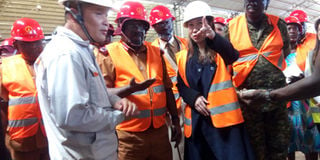Supply of Sukulu fertilisers to start in January, says NEC

Tour. Ms Jane Gou, the Guangzhou Dogsong Energy Group chief executive officer explains a point during the tour of the Sukulu Industrial Complex. PHOTO BY AMOS NGWOMOYA
What you need to know:
- Fertiliser products. Some of the fertilisers include rock phosphate, inorganic fertilisers, water soluble fertilisers, organic fertilisers and crop specific fertilisers.
National Enterprise Corporation (NEC) has said it will start supply of fertilisers from the Sukulu Industrial Complex by January, 2020.
This was revealed by Mr Simon Terwane, the general manager of NEC Agro, a subsidiary of NEC during a tour of Uganda Prisons Service officials at the Sukulu Industrial Complex in Tororo District.
“We want to assure all farmers that the fertilisers that are produced in Sukulu are genuine and we will start supply by January this year because the quantity is still small. Soils in Uganda have depreciated over time and have also noticed there is depletion of organic matter but the good news is that the Sukulu fertilisers have come to enable farmers get better produce,” he said.
Some of the fertilisers include; rock phosphate, inorganic fertilisers, water soluble fertilisers, organic fertilisers and crop specific fertilisers.
NEC is a state enterprise under the Ministry of Defence and is currently involved in the manufacturing, construction and extension services in the agricultural sector.
Government directed NEC to work as off-takers and distributors of fertilisers and steel manufactured by Guangzhou Dogsong Energy Group at Sukulu Industrial Complex in Tororo District.
This was arranged through the Commodity Sales Agreement relating to the output from the Sukulu Industrial Complex signed in September 2015. Mr Terwane said that although it had been previously envisaged that the plant would manufacture a single line fertilizer, market driven upgrades have been made to expand the product line to phosphate-based fertilisers.
He also noted that the factory has capacity to produce 100,000 tonnes of fertilisers annually and is able to blend a wide spectrum of fertilisers, noting that the fertilisers not only improve nutrients but also lead to speedy growth of crops.
“It will be the cheapest fertilizer in the region because it is being manufactured from the mineral site. Currently, at least 77000 tonnes of fertilisers are consumed by farmers annually but the Sukulu plant will be producing 100,000 tonnes annually. This means that there will be plenty of fertilisers,” he said.
A 50 kilogramme bag of fertilisers from Sukulu, Mr Terwane said, will cost between Shs50,000 and Shs100,000 depending on the type of fertilizer.
Asked whether the manufacturer has been cleared, Mr Terwane said they have since secured market entry licenses and certifications including commercial production license, Uganda National Bureau of Standards, and Ministry of Agriculture.
However, he acknowledged that being a new product, farmers need to be sensitised about its effectiveness so that they could embrace it.
The Sukulu Industrial Complex is the mining and manufacturing complex currently being developed in Osukuru County in the eastern district of Tororo.
It is intended to include a phosphate fertilizer factory, a steel manufacturing factory, a sulphiric acid manufacturing complex, a mining and beneficiation plant, and a hydro-metallurgical plant.
Reducing imports
The Commissioner General of Uganda Prisons Johnson Byabashaija, said the new fertilizer will reduce the Prisons expenditure on imports, noting that they currently spend Shs3b on fertilisers.
“We are the biggest producer of agricultural and other commercial crops and this makes us a potential client. We are happy that we will no longer import fertilisers because it is very costly. I am also very optimistic that this is the end of fake fertilisers on the market,” he said.
Dr Byabashaija also noted that the Prisons procurement team will first discuss the modalities of entering into business with a new partner before actual consumption starts.
He revealed that Prisons currently grows 10,000 acres of maize annually and 9,600 acres of cotton.
Ms Jane Gou, the Guangzhou Dogsong Energy Group chief executive officer, said the factory is ready to produce fertilisers in whichever quantity as long as there is market for it.
“Our pride is to see farmers consume our products and we pledge to produce genuine fertilisers which meet standards [without] compromising quality,” she said.




